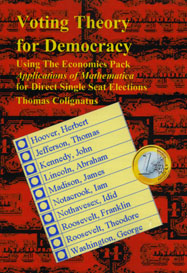|
|

Description
Voting Theory for Democracy provides the concepts and tools for democratic decision making. Voting is used not only in politics and government, but also in business - and not only in the shareholders’ meetings but also in teams. Voting however can suffer from paradoxes. In some systems, it is possible that candidate A wins from B, B from C, and C from A again. This book explains and solves those paradoxes, and thereby it gives a clarity that was lacking up to now. The author proposes the new scheme of ‘Pareto Majority’ which combines the good properties of the older schemes proposed by Pareto, Borda and Condorcet, while it adds the notion of a (Brouwer) ‘fixed point’. Many people will likely prefer this new scheme over Plurality voting which is currently the common practice. You can benefit from this book also when you do not have the software. However, with the software, you will have an interactive environment in which you and your group can use the various voting schemes, or test them to decide which scheme better fits your purposes. The software is included in The Economics Pack - by the same author - which is an application of Mathematica, a system for doing mathematics with the computer. The Pack has users in many countries in the world. The Pack is available for Windows XP, Macintosh and Unix platforms and requires Mathematica 8.0.1 or later. It can be freely downloaded, but you need a licence to run it. Contents Voting theory and programs | Getting started | Items, voters, preferences and morals | Basic schemes | Combined schemes | Strategic voting | Probability | Measuring utility | Theoretical base | Evaluation of Arrow’s Theorem Related Topics Economics and Finance |
|
|
